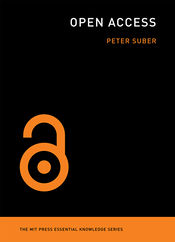Open Access (the book): Difference between revisions
Jump to navigation
Jump to search
No edit summary |
|||
| Line 34: | Line 34: | ||
== Reviews == | == Reviews == | ||
* Rob Harle, [http://www.leonardo.info/reviews/aug2012/suber-harle.php Open Access], | * Rob Harle, [http://www.leonardo.info/reviews/aug2012/suber-harle.php Open Access], Leonardo Reviews, August 2, 2012. ''"This is a very important book, which, I suggest, is a must read for all scholars and researchers who publish their own work or consult the peer-reviewed published work of others––in other words, virtually all academics."'' | ||
== Updates and supplements == | == Updates and supplements == | ||
Revision as of 12:59, 6 August 2012
- On this page I'll post updates, supplements, and other notes on my book, Open Access, MIT Press, 2012. —Peter Suber.
- Suggested short URL for this page = http://bit.ly/oa-book
About the book
- Peter Suber, Open Access, MIT Press, June 2012.
- The paperback and Kindle editions are available now. Digital editions in a dozen other formats will roll out over the summer of 2012.
- I hope the book is available at your favorite academic bookstore. But at least it's available from MIT Press, Amazon, Google Play, and the sources listed here and here.
- The whole book will become OA in June 2013, one year from the date of publication. If you can't wait that long, everything I've said in the book I've said in some form or another in an OA article, probably more than once.
- MIT Press is already providing OA to the Table of Contents, Series Forward, Preface, Chapter 1 ("What Is Open Access?"), and the Index.
- Search the text with Google book search. Also see the Google preview.
- Sorry, I don't control review copies. To get a review copy, contact MIT Press.
- I plan to launch some kind of site, other than this page, where I can gather and respond to reader comments. I welcome suggestions about the best way to do that. Meantime, I welcome comments on the book itself.
Reviews
- Rob Harle, Open Access, Leonardo Reviews, August 2, 2012. "This is a very important book, which, I suggest, is a must read for all scholars and researchers who publish their own work or consult the peer-reviewed published work of others––in other words, virtually all academics."
Updates and supplements
- Some of these notes were too late to put in the book. The publications or developments they describe hadn't occurred by the time my text was final in the spring of 2011. Some just didn't fit into the book. The book is deliberately short and I was already over my wordcount.
- I have many supplements to add and will add them as I find time. If you want to nudge me on a certain point, please do.
- For now, I'm taking advantage of the digital medium by linking from words and phrases, not imitating the format of printed endnotes by spelling out URLs.
Preface
- Note that MIT Press already provides OA to the Preface.
Chapter 1: What is Open Access?
- Note that MIT Press already provides OA to Chapter 1.
Chapter 2: Motivation
- Note 5 (note call on p. 30, note text on p. 182). Here I'm documenting the assertion that "cumulative price increases...forced the Harvard Library to undertake 'serious cancellation efforts' for budgetary reasons." In the current note, I cite two sources. Here are seven, including the original two, in chronological order.
- Robin Peek, "Harvard Faculty Mandates OA," Information Today, April 1, 2008. This is an interview with Stuart Shieber after the Harvard Faculty of Arts and Sciences voted unanimously for a green OA policy on February 12, 2008. Quoting Shieber: "At Harvard, serials duplication has been all but eliminated and serious cancellation efforts have been initiated. Monograph collecting has been substantially affected as well. In total, our faculty have seen qualitative reductions in access to the literature." (I link to a copy of the original article because the original URL is now dead.)
- The Report of the Task Force on University Libraries, Harvard University, November 2009. "Even during the recent years of endowment growth, the libraries struggled to collect the books, journals, and other research materials desired by current faculty and students....The reasons for these difficulties are multiple, but include the steadily rising prices of monographs and journal subscriptions....The economic downturn has made this issue even more critical than in years prior. Because library budgets have been cut, journals will need to be cancelled, with attendant cancellation fees feeding a downward spiral....Harvard must become a more forceful participant in this negotiation, leverage its combined rather than distributed weight, and not be beholden to the prices and packages determined by the major publishing houses."
- "Libraries on the Edge," The Harvard Gazette, January 2010. "Through centuries, Harvard's libraries have amassed rich collections and unique holdings. But now budgetary pressures that have been building during the past decade, and intensified in the past year, threaten the ability of the world's largest private library to collect works as broadly as it has in the past. In an interview, University Library director and Pforzheimer University Professor Robert Darnton called the situation 'a crisis in acquisitions.' "
- Harvard's response to the first White House RFI on OA, January 22, 2010. "Harvard University...is not imm
